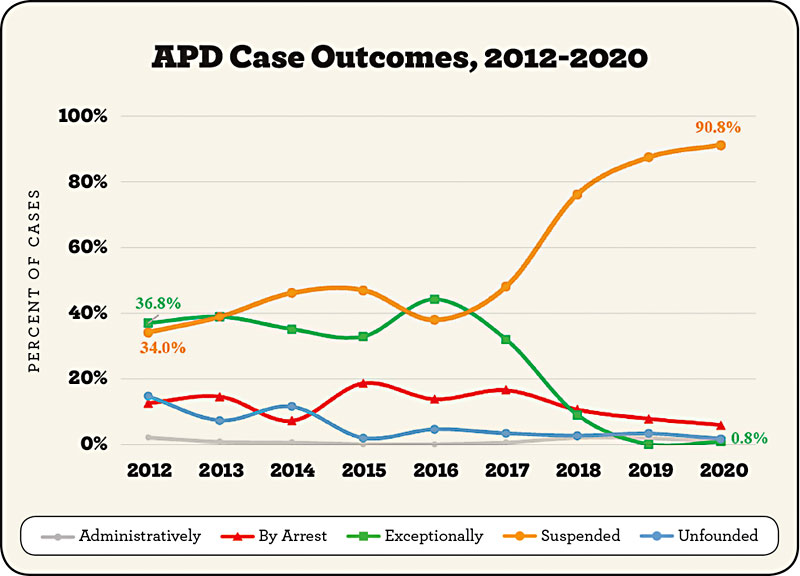APD Sexual Assault Audit Validates Survivor Concerns
Changing the culture
By Austin Sanders, Fri., Nov. 25, 2022
Nearly four years after City Council ordered a comprehensive external audit of the Austin Police Department's management of sexual assault cases, the three organizations tasked with carrying out that audit have delivered their final report. Overall, the report found that while APD has made improvements, much remains to be done.
The Police Executive Research Forum (PERF), Women's Law Project, and the Wellesley Centers for Women worked together on the audit, which experienced numerous delays and cost $950,000. The work that went into the 182-page report was extensive: reviewing nearly 1,500 sexual assault cases going back to 2012; evaluating internal APD policies for investigating sex crimes; and conducting interviews with Sex Crimes Unit detectives, APD's Victim Services Division, survivor advocates and support groups, and other stakeholders.
Council called for the audit following multiple APD scandals that exposed how the department was failing survivors of sexual assault. Detectives within the SCU frequently and improperly marked cases as "exceptionally cleared" without taking the routine investigative steps required to help survivors achieve justice. (That FBI designation requires strict criteria, which amount to the investigator concluding that the crime cannot be solved despite best efforts.) The department's now-shuttered DNA crime lab was so poorly managed that the rape kits used to collect physical evidence of an alleged assault were left to deteriorate in storage for so long that they became unusable in court.
The report makes dozens of recommendations for changing APD's processes and policies to improve its response to sexual assault. Among them: staffing the SCU with detectives outside of regular Monday-Friday hours to more quickly assign cases after sexual assaults are reported; ensuring detectives meet with complainants in person; following up with survivors several times before concluding they are unwilling to proceed with an investigation; and requiring more victim-centered and trauma-informed training not only for the SCU but also for patrol officers.

For survivor advocates like Hanna Senko, who has devoted the past five years to pushing APD toward reform, the report is welcome but also frustrating. "The issues raised in the PERF report validate the concerns that survivors and advocates have been voicing for years," Senko told us. "While I am glad that these issues have been substantiated, I would expect APD to have been aware of these shortcomings for a very long time. Trust needs to be established with victims, survivors, and the community at large, and it is going to require intentional transparency and change from APD."
Beyond recommendations for reform, the report also provides several valuable data points that APD, advocates, and Council can use as benchmarks. For example, APD (working with third-party DNA labs such as the Texas Dept. of Public Safety's crime lab) has been processing rape kits much faster. In 2015, it took an average of 320 days for a rape kit to be processed; by 2020, that number had fallen to 66 days. That's still longer than state law now requires; a 2019 measure requires law enforcement to process rape kits within 30 days of receipt.
The report also found that APD has improved in how often it closes cases under "exceptional clearance." An explosive 2016 investigation published by Reveal, followed up rigorously by former Chronicle writer Sarah Marloff, found that APD was frequently clearing cases exceptionally without meeting the requisite criteria. PERF found that in 2012, 81% of the 365 exceptionally cleared cases reviewed were improperly assigned that designation; by 2020, that percentage dropped to zero (among a much smaller set of cases, it should be noted).
These are encouraging improvements. But for advocates, understanding why an improvement happened is as important as the improvement itself. The ultimate goal for advocates is to help usher in a culture shift at APD, to erode disbelief of survivors and raise the priority given to staffing and training officers who respond to sex crimes. Police Chief Joe Chacon has said he supports this culture shift, and it was a focus of his confirmation hearing before Council in 2021.
The APD Victim Services Division aided Chacon in this goal, and the division gets multiple shout-outs in the PERF report for setting the standard nationally in how to help victims of sexual assault as they navigate the justice system. But overall, advocates have little evidence of a true culture shift. The decline in "exceptional clearance" cases is not because more cases are being solved, but because they're now classified as suspended (see chart), including more than 90% of the cases reviewed from 2020.
Juliana Gonzales, senior director of sexual assault and health services at SAFE Alliance, stressed the importance of taking a close look at the data that seems to reflect improvement at APD. "It will be critical for the community to deeply explore whether improvements like these are the result of superficial administrative change or a culture shift, because only culture shifts will produce long-term, sustainable change."
For its part, APD says it's committed to working with community partners on implementing recommendations, starting with a small working group to prioritize the recommendations, an APD spokesperson told us. Some recommendations have already been fulfilled: A crime analyst works with SCU and new vehicles have been ordered so that each SCU detective will have their own, for example. APD is set to meet with stakeholders this week to begin the implementation process.
Got something to say? The Chronicle welcomes opinion pieces on any topic from the community. Submit yours now at austinchronicle.com/opinion.







